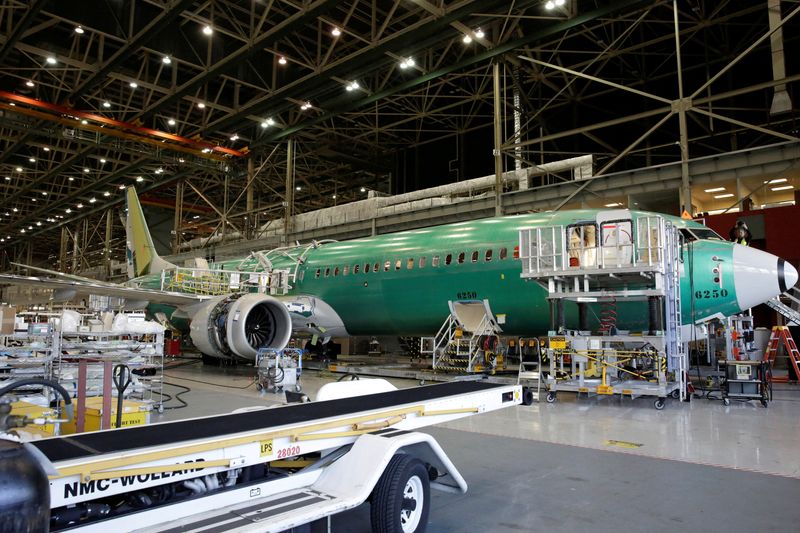By Valerie Insinna
WASHINGTON (Reuters) -Boeing has signaled to suppliers that plans to ramp up production of its bestselling 737 narrowbody jetliner will move about two months more slowly than originally anticipated, according to two people with knowledge of the matter.
The U.S. planemaker now expects it will produce 42 of its 737s per month starting in February 2024, according to a new master schedule that Boeing (NYSE:BA) briefed to its suppliers over the past week, the sources said.
Both Boeing and its European rival Airbus have laid out ambitious plans to increase production, particularly for popular single-aisle models, to meet soaring customer demand. However, both planemakers have had to battle supply chain bottlenecks and production disruptions.
Analysts had already suspected Boeing would alter its on-paper schedule, which targeted the end of 2023 to reach 42 jets produced per month, after a supplier error slowed ramp-up plans this autumn.
The new schedule pushes subsequent rate increases as well, shifting Boeing's plan for 47.2 jets a month from June to August 2024, while its target to increase 737 production to 52.5 jets a month was moved from December 2024 to February 2025.
Boeing now expects to hit its pre-pandemic goal of 57.7 aircraft per month in October 2025, a delay of three months from the original July 2025.
Boeing declined to comment specifically on the new master schedule, which it does not disclose.
“We still plan to increase to 50 airplanes per month in the 2025/2026 timeframe," a spokesperson said, reaffirming one of the company's publicly acknowledged targets.
Boeing shares closed flat on Thursday after falling 1.5% following Reuters' publication of the new schedule.
Deutsche Bank said in a Thursday note to investors that a move to 42 jets a month in February would be "good news," as most investors predicted the increase would happen in the second or third quarter of 2024.
The master schedule for 737 - which lays out the expectation for when suppliers should be at a given production rate - gives an important drumbeat and gauge of confidence to one of the industry’s most important global supply chains.
But the schedule may not exactly correspond with the exact point in time a planemaker is able to achieve a steady production rate, and it is not uncommon for it to change due to various factors.
Stan Deal, head of Boeing's commercial airplanes division, told Bloomberg TV in June that the company was considering ramping up to 42 jets per month by the end of 2023 - a rate change that was later reflected in the supplier master schedule reported by Reuters in October.
The company announced in July that it was increasing 737 production from 31 to 38 jets per month.
However, a supplier error discovered in August forced Boeing to conduct time-consuming inspections of some of the 737 MAXs on its production line and in its inventory, slowing the ramp-up.
In October, Boeing CEO Dave Calhoun said the company planned to reach production of 38 planes per month by year-end.
"We are keeping our suppliers hot according to the master schedule," he said at the time.

Calhoun has said that Boeing is capitalized to manufacture 60 737s a month and there is adequate demand to boost production to those levels, but the company needs to ensure those planned rate increases can make it through the supply chain.
Before the 2019 grounding of the 737 MAX, Boeing was producing 52 737s a month.